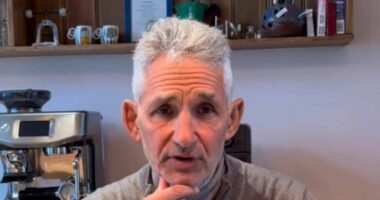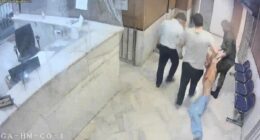Share this @internewscast.com
Esther Littlewood, a 20-year-old with dreams of joining the police force, initially brushed off the headache that crept over her as she watched television. Residing in the tranquil town of Matlock, Derbyshire, Esther didn’t suspect that anything more serious could be lurking beneath the surface.
In keeping with her active and healthy lifestyle, Esther took a simple paracetamol, expecting it to relieve her discomfort. Feeling the need for rest, she retreated to her room for a nap, unaware of the looming urgency of her condition.
However, the situation took a sudden turn for the worse. Esther’s partner later found her unresponsive in bed, prompting a swift rush to Chesterfield Royal Hospital. There, doctors made the critical decision to place her in a coma as they sought answers.
After a series of tests, the medical team uncovered the startling truth behind Esther’s ordeal: she had suffered a stroke, its root cause being a previously undiagnosed patent foramen ovale, or a hole in her heart.
Detailed scans revealed that this small, flap-like opening in her heart’s upper chambers had enabled a blood clot to slip through and travel to her brain, leading to her distressing condition. Esther’s story serves as a poignant reminder of how something seemingly minor can have profound implications.
Scans showed that a small flaplike opening in her heart’s upper chambers had allowed a blood clot to slip through and travel up to her brain.
She was brought out of a coma and after 12 days in hospital was discharged, awaiting surgery to close the opening in her heart.
Now, Ms Littlewood is urging others not to ignore the subtle signs of a stroke and is desperate to raise awareness of the condition, patent foramen ovale.

After taking a paracetamol to reduce her symptoms, Esther Littlewood — who prided herself on being ‘really fit and healthy’ — went to her room to take a nap

But just hours later, her partner discovered her unresponsive on the bed and she was rushed to Chesterfield Royal Hospital where she was placed into a coma
Recalling her terrifying ordeal, which happened in June this year, she said: ‘I was quite active. I’d passed all the tests to get into the police and was due to start in August.
‘It’s always been a passion of mine. The process to join was very intense but I was so excited to start.
‘I’d been doing all this running every day to train for the tests. I was really fit and healthy.
‘I can’t really remember the day it happened.
‘My mum said we were downstairs watching “24 Hours in Police Custody” and said I went to the left side of my head near my ear and said “that hurts”.
‘I told her I had a really bad headache and took some paracetamol. Apparently I said I needed to go for a nap.’
After she was rushed to hospital, MRI scans detected her patent foramen ovale.
‘With a stroke, you think you’d see something on your face or arms but the only sign I had was a headache,’ Ms Littlewood said.

Tests later revealed the true cause of her agony — a stroke triggered by a previously undiagnosed hole in her heart, called a patent foramen ovale
‘The coma felt like I was having a two-hour long dream. When I woke up apparently I said to my mum “I know this is a dream, it can stop now”.
‘They told me to have a stroke this young is extremely rare. With the surgery, it’s nearly impossible to have another stroke.
‘In a way I felt like I’d lost my job that I’d worked so hard for. I lost being able to drive. I lost my independence. I felt like a different person.’
Ms Littlewood, who is now due to join the police in March, has urged people who suddenly suffer ‘bad headaches’ to get them checked out as soon as possible.
‘I didn’t believe them when they told me I’d had a stroke. I couldn’t believe it,’ she said.
‘If you have a really bad headache that doesn’t feel right, call 111. Look out for those symptoms. Check where the headache is.
‘If you feel a pain in the side or back of the head, just get it checked. It needs to be more talked about. I want to spread awareness of this.’
A patent foramen ovale usually closes after birth.

Now, Ms Littlewood is urging others not to ignore the subtle signs of a stroke and is desperate to raise awareness of the condition, patent foramen ovale
During development in the womb, a flap of tissue acts like a valve, to allow oxygen to circulate in the blood and bypass the lungs.
It then seals over time in most people, but in some cases this doesn’t happen.
Around 25 per cent of adults in the UK have a patent foramen ovale, often without knowing it, according to the British Heart Foundation.
While it doesn’t cause problems for most people, it can increase the risk of stroke for those with bigger holes or if they have an abnormally strong blood flow, known as the shunt, between the two upper heart chambers.
It can be corrected with surgery to seal the hole between the sides of the heart.
However, not everyone who is found to have a patent foramen ovale will need treatment — generally it’s only if they’ve already had a stroke or are known to have a higher risk of clots.
Strokes affect more than 100,000 Britons annually — one every five minutes — claiming 38,000 lives.
This makes it the UK’s fourth biggest killer and a leading cause of disability.
Almost 800,000 people in the US are struck down each year, causing 137,000 deaths.















